boiling eggs might seem like the simplest of tasks, but achieving that perfect texture – with a velvety yolk and firm, yet tender white – can feel like a culinary mystery, especially for beginners. As a seasoned cook, I've had my fair share of egg-boiling mishaps. From those rubbery whites that make you think you're chewing on a bouncy ball to runny yolks that threaten to spill everywhere, I've experienced the full spectrum of egg-boiling disasters. But through trial and error, I've finally cracked the code to consistently boiling eggs to perfection.
This guide is dedicated to those who are new to the world of egg-boiling or for those who, like me, have struggled to achieve that coveted consistency. I'll be sharing my tried-and-tested tips, tricks, and insights, all aimed at helping you conquer the art of boiling eggs. We'll delve into the science behind the perfect egg, explore the different types of boiled eggs, and provide a step-by-step guide to ensure you always end up with flawlessly cooked eggs.
(Part 1) The Essentials: What You Need
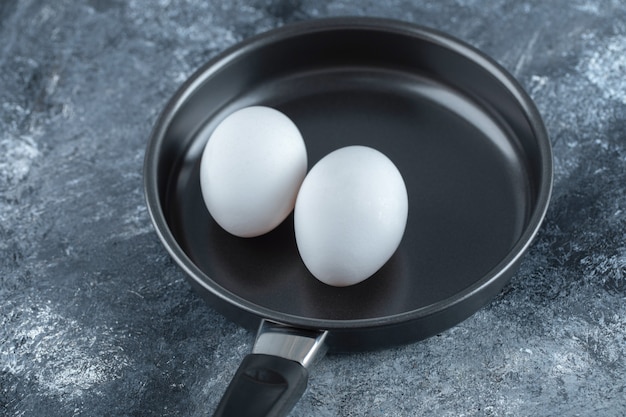
choosing the right eggs
It all starts with the eggs. You might think any egg will do, but there are actually a few things to consider for optimal results.
I always prefer using fresh eggs for boiling. The thicker white of fresh eggs holds its shape better during cooking, resulting in a firmer, more satisfying texture. But, if you're using older eggs, don't worry - they'll still cook just fine, it's just that the whites might be slightly thinner.
Always check the "best before" date on the carton. While a good boil can still make slightly older eggs edible, make sure the shell isn't cracked - no one wants an egg explosion in their pot!
The Equipment: A Simple Setup
For boiling eggs, you won't need any fancy gadgets or a Michelin-star kitchen. All you need is a few basic essentials:
- A saucepan: Choose a saucepan large enough to comfortably hold the eggs without overcrowding them. This ensures even cooking and prevents the eggs from bumping into each other and cracking.
- Cold water: You'll need enough cold water to completely cover the eggs by at least an inch. This ensures even heat distribution and prevents the eggs from sticking to the bottom of the pot.
- A slotted spoon or spider: This tool will be your best friend for gently lifting the eggs out of the hot water, preventing any accidental drops.
- A bowl filled with ice water: This is crucial for shocking the eggs immediately after boiling, stopping the cooking process and preventing the yolks from overcooking and turning green.
And that's it! No fancy timers, temperature probes, or other kitchen gizmos are needed. Just a few simple tools and your desire to achieve egg-boiling perfection.
(Part 2) The Boiling Process: Step by Step
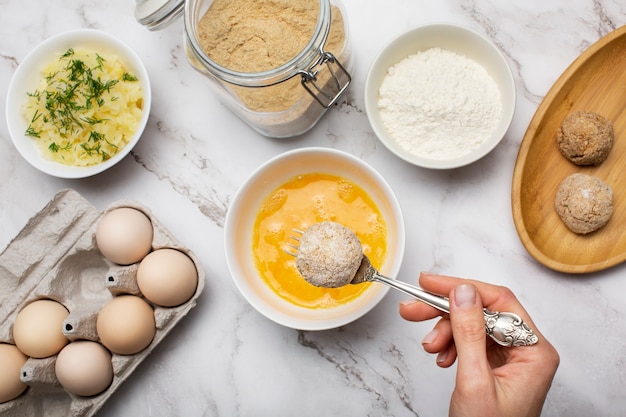
1. The Initial Plunge: Submerging the Eggs
First, gently place the eggs into the saucepan, ensuring they are fully submerged in the cold water. If you're boiling more than a few eggs, make sure they have enough room to move around freely, preventing them from bumping and potentially cracking.
I often add a tablespoon of salt to the water. This not only helps to prevent the eggs from cracking, but it also adds a touch of flavour to the eggs, especially if you're making deviled eggs. It's not a must-have, but I find it makes a noticeable difference in the final flavour profile.
2. The Heat: Bringing it to a Boil
Now comes the crucial part: bringing the water to a rolling boil. Keep a watchful eye on the pot and ensure the water is bubbling vigorously. This is where things can get a bit tricky. Overcooking can lead to tough yolks and rubbery whites, so precision is key.
3. The Timing Game: Getting it Right
Once the water reaches a full boil, start your timer. The length of time you cook the eggs for depends on the desired level of doneness. Here's a handy guide for different types of boiled eggs:
| Egg Type | cooking time |
|---|---|
| Soft-boiled | 3-4 minutes |
| Medium-boiled | 6-8 minutes |
| Hard-boiled | 8-10 minutes |
Remember, this is a guideline. The cooking time will vary depending on the size of the eggs and the altitude you're at.
4. The Shocking Method: Stopping the Cooking
As soon as your timer goes off, immediately transfer the eggs into a bowl filled with ice water. This is crucial for stopping the cooking process and preventing the yolks from overcooking and turning an undesirable shade of green.
The shock of the cold water rapidly cools the eggs, ensuring the cooking process is halted, resulting in a perfect, evenly cooked egg.
5. Peeling Perfection: Tips and Tricks
After shocking the eggs, let them cool completely in the ice bath. This will make peeling them much easier.
Here are a few tips for peeling your boiled eggs like a pro:
- Crack the shell: Gently tap the egg all around, creating a series of cracks in the shell. This will help the shell to loosen up and come off more easily.
- Gentle peeling: Use your fingers or a spoon to gently peel away the shell. Start at one end of the egg and work your way around.
- Rolling technique: If the shell is being stubborn, try rolling the egg on the counter to loosen it up.
- Tools for stubborn shell: Use a blunt knife or a spoon to help you peel away any remaining bits of shell that are clinging to the egg.
Remember, patience is key when peeling boiled eggs. Take your time, and the shell should come off relatively easily, leaving you with a perfectly peeled egg.
(Part 3) The Different Types: Exploring the Options
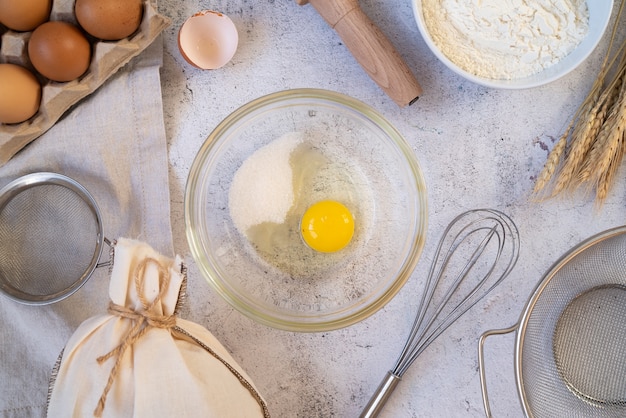
soft-boiled eggs
Soft-boiled eggs are a breakfast classic. They have a runny yolk, almost like a custard, with a firm white. They're perfect for dipping soldiers (toast cut into strips) or enjoying with a simple piece of toast. I find the best way to eat a soft-boiled egg is to carefully cut it in half and scoop out the runny yolk with a spoon, while savoring the firm white alongside.
For me, soft-boiled eggs are the ultimate comfort breakfast. They have a creamy texture and a delicate flavour that's hard to beat.
medium-boiled eggs
Medium-boiled eggs offer a happy medium between soft-boiled and hard-boiled eggs. The yolk is still creamy, but it's a bit firmer, while the white is firm and holds its shape well.
I enjoy medium-boiled eggs for salads or sandwiches. They add a satisfying creaminess without being overly runny and work beautifully with other ingredients.
Hard-Boiled Eggs
Hard-boiled eggs have a solid, completely set yolk and a firm white. They're a versatile ingredient, perfect for a quick snack, adding to salads, or making deviled eggs.
Hard-boiled eggs are a staple in my fridge. They're perfect for a quick snack or a simple lunch. I often slice them and add them to a salad for a protein boost.
(Part 4) Beyond the Basics: Tips and Tricks for Perfection
The Science Behind the Perfect Egg
Understanding the science behind boiling eggs is key to achieving the perfect texture. The heat of the boiling water cooks the proteins in the egg, causing them to solidify. The longer you cook the egg, the more the proteins solidify, resulting in a firmer texture.
The yolk, primarily composed of fat, cooks more slowly than the white. This explains why the yolk remains softer than the white, even after longer cooking times.
Avoiding the green ring: A Common Problem
You might have noticed a green ring around the yolk of some hard-boiled eggs. This occurs due to a chemical reaction that happens when the egg is overcooked. When the egg is cooked for too long, the iron in the yolk reacts with the sulfur in the white, creating a compound called ferrous sulfide, which gives the yolk a greenish hue.
To avoid this, ensure you shock the eggs in ice water immediately after boiling. This will stop the cooking process and prevent the green ring from forming.
Achieving the Perfect Texture: Tips for Soft-Boiled Eggs
For those who love the runny yolk of a soft-boiled egg, there's a trick to elevate it to perfection.
Once the timer goes off, carefully remove the egg from the boiling water and gently tap it on the counter to crack the shell. Then, hold the egg under cold running water for a few seconds. This will help to cool the yolk slightly, while keeping the white firm.
This simple technique results in the ideal soft-boiled egg with a creamy, runny yolk and a perfectly firm white. It's a small trick, but it makes a significant difference in the final texture and taste.
(Part 5) The Art of Serving: Adding Flair to Your Boiled Eggs
From Basic to Beautiful: Enhancing Your Presentation
Boiled eggs don't have to be boring. With a little creativity, you can transform them into a visually appealing and delicious dish.
Here are a few ideas for presenting your boiled eggs:
- Deviled Eggs: A classic for a reason, deviled eggs are a fantastic way to elevate the humble boiled egg. Simply mash the yolk with mayonnaise, mustard, and seasonings, then pipe it back into the egg white. Get creative with your seasonings and toppings - paprika, chopped chives, or a sprinkle of bacon bits are all excellent choices.
- egg salad Sandwiches: A simple yet satisfying lunch or snack, egg salad sandwiches are a great way to use up leftover boiled eggs. Mix chopped boiled eggs with mayonnaise, celery, onion, and seasonings, then serve it on bread or crackers. You can also add a touch of sweetness with a bit of Dijon mustard, or a spicy kick with a dash of hot sauce.
- Salads: Boiled eggs add a protein boost and a satisfying texture to any salad. They're especially delicious in salads with leafy greens, avocado, and tomatoes. Slice the eggs for a neater presentation or chop them for a more rustic look.
- Breakfast Bowls: Boiled eggs are a versatile ingredient for breakfast bowls. Slice them up and add them to oatmeal, yogurt, or smoothies for a boost of protein and nutrition. They also add a delightful texture and flavour to a hearty breakfast.
Get creative with your presentation! Use colourful vegetables, herbs, and spices to add pops of colour and flavour to your boiled eggs.
(Part 6) Beyond the Plate: Nutritional Benefits of Boiled Eggs
A nutritional powerhouse: Packed with Protein and More
Boiled eggs are a true nutritional powerhouse. They're packed with protein, vitamins, and minerals that are essential for good health.
Here are just a few of the nutritional benefits of boiled eggs:
- High in Protein: Boiled eggs are an excellent source of protein, which is essential for building and repairing tissues, maintaining muscle mass, and supporting a healthy metabolism. Protein is also essential for feeling full and satisfied after a meal.
- Rich in Vitamins: Boiled eggs are a good source of vitamins B12, B2, D, E, and K, all of which play important roles in various bodily functions, including energy production, immune system health, and bone health.
- Packed with Minerals: Boiled eggs are also a good source of minerals like selenium, zinc, and iron. Selenium is an antioxidant that helps protect the body from damage caused by free radicals, while zinc is essential for immune function and wound healing. Iron is important for carrying oxygen throughout the body.
- May Improve Brain Function: Boiled eggs are a good source of choline, a nutrient that is essential for brain health. Choline helps to support memory, learning, and cognitive function.
Incorporate boiled eggs into your diet for a healthy and delicious source of nutrients. They're a versatile ingredient that can be enjoyed in a variety of ways.
(Part 7) A culinary journey: My Personal Egg-Boiling Experiences
From Disaster to Delight: Learning to Perfect the Art
My journey with boiling eggs hasn't always been smooth sailing. I've had my fair share of egg-boiling mishaps, from rubbery whites that made me think I was chewing on a bouncy ball to runny yolks that threatened to spill everywhere.
I remember one particularly disastrous attempt where I left the eggs on the stove for far too long. The whites turned into a rubbery, inedible mass, and the yolks were like hard-boiled marbles. I was so frustrated that I swore off boiling eggs for a while.
But I knew I had to learn how to do it right. So I started researching, experimenting, and paying close attention to the timing. It took a few more attempts, but eventually, I cracked the code! I discovered that the key to success lies in careful timing and a quick ice bath.
Now, I'm confident in my egg-boiling skills, and I love the versatility of boiled eggs. They're a staple in my kitchen, and I enjoy them in a variety of ways.
(Part 8) FAQs: Answering Your Most Common Egg-Boiling Questions
1. Why Do Boiled Eggs Crack?
Boiled eggs can crack for a few reasons. The most common reasons include using eggs with cracks, sudden changes in temperature, and overcrowding the pot. To prevent cracking, make sure to use fresh, uncracked eggs, add the eggs to cold water, and give them enough room to move around in the pot.
2. What Happens If I Overcook Boiled Eggs?
Overcooked boiled eggs have a tough, rubbery texture. The whites will be firm and the yolks will be hard and chalky. Overcooking can also cause a green ring to form around the yolk.
3. Can I Boil Eggs in the Microwave?
It's not recommended to boil eggs in the microwave. The heat can be uneven, leading to an explosion. Additionally, the texture of microwaved eggs is often not as desirable.
4. Can I Eat Boiled Eggs Every Day?
Yes, it's perfectly safe to eat boiled eggs every day. They're a good source of protein, vitamins, and minerals. However, moderation is key. It's a good idea to vary your diet and include other sources of protein as well.
5. How Long Can I Keep Boiled Eggs in the Fridge?
Boiled eggs can be stored in the refrigerator for up to a week. Make sure to keep them submerged in cold water to prevent them from drying out.
With these tips and tricks, you'll be on your way to boiling eggs like a pro. So, grab your eggs, your saucepan, and your ice water, and get ready to conquer the art of boiling eggs to perfection!
Everyone is watching

How to Cook Frozen Lobster Tails Perfectly: A Step-by-Step Guide
RecipesLobster. Just the word conjures up images of lavish meals, special occasions, and a taste of luxury. But let's...

Pigs in a Blanket Cooking Time: How Long to Bake for Perfect Results
RecipesAh, pigs in a blanket. Just the name conjures up images of those delightful little parcels of crispy pastry en...

Pork Fillet Cooking Time: How Long to Cook It Perfectly
RecipesPork fillet, or tenderloin as it's sometimes called, is a real favourite in our house. It's so versatile, and...
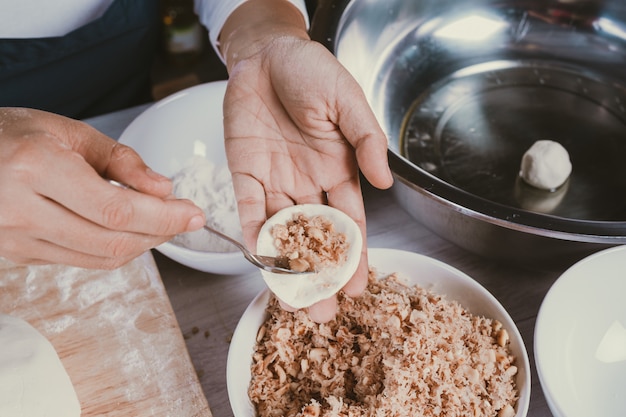
The Ultimate Guide to Tender, Juicy Pulled Pork
RecipesRight, let's talk pulled pork. It's one of those dishes that just screams "comfort food," doesn't it? I mean...
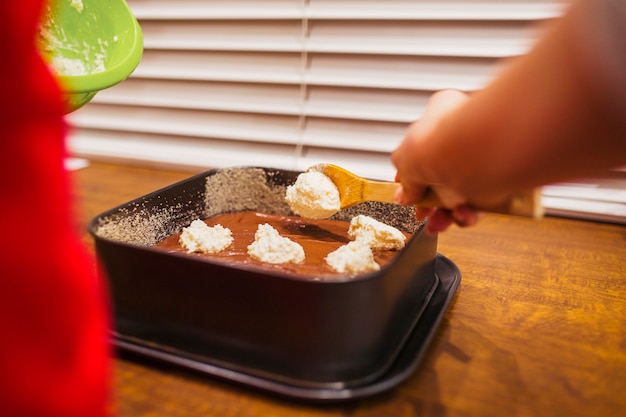
The Ultimate Guide to Cooking Delicious Frankfurters
RecipesLet's face it, we all love a good frankfurter. It's a classic, simple, and always satisfying. But let's be rea...
